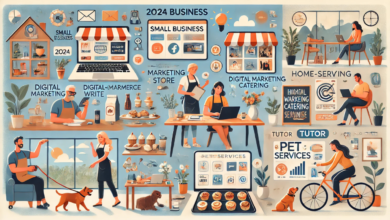The Future of E-commerce: Insights on Digital Commerce

Introduction: A New Era for E-commerce
The evolution of e-commerce is reshaping the global marketplace. As technology advances, Digital commerce becomes more personalized, efficient, and ubiquitous. Businesses must adapt to these rapid changes to remain competitive. In this article, we explore the key trends shaping the future of e-commerce and offer insights into what lies ahead.
The Rise of Artificial Intelligence and Automation
Artificial Intelligence (AI) and automation are transforming e-commerce operations. From customer service to inventory management, these technologies are streamlining processes and enhancing the user experience.
AI-Powered Personalization
AI enables businesses to analyze vast amounts of data to predict consumer behavior and preferences. By offering personalized product recommendations, tailored marketing campaigns, and dynamic pricing, AI creates a seamless shopping experience.
- Chatbots and Virtual Assistants: Automated tools powered by natural language processing are available 24/7 to resolve customer queries.
- Predictive Analytics: AI algorithms help anticipate trends, allowing businesses to stay ahead of market demands.
Automation in Fulfillment
Warehouse robots, automated picking systems, and drones are revolutionizing logistics. These innovations reduce costs, improve efficiency, and accelerate delivery times, meeting the growing demand for fast shipping.
Omnichannel Retailing: A Seamless Customer Journey
Consumers now expect a consistent shopping experience across multiple channels. Omnichannel retailing integrates physical stores, e-commerce websites, and mobile platforms to deliver a unified brand experience.
Mobile Commerce (M-Commerce)
Mobile devices are central to the e-commerce landscape. Businesses must optimize their websites and apps for mobile users by offering:
- Responsive Design: Ensures a seamless browsing experience on any device.
- Mobile Payment Options: Features like Apple Pay and Google Pay make transactions effortless.
Social Commerce
Social media platforms are becoming powerful sales channels. Features like shoppable posts, live-stream shopping events, and influencer partnerships enable businesses to reach targeted audiences directly.
The Role of Sustainability in E-commerce
Sustainability is no longer optional. As consumers prioritize eco-friendly products and practices, businesses must adapt to these expectations.
Green Logistics
- Eco-Friendly Packaging: Biodegradable and recyclable materials reduce environmental impact.
- Carbon-Neutral Shipping: Companies like Shopify and Amazon are investing in sustainable delivery solutions.
Ethical Consumerism
Transparent supply chains and ethical sourcing are gaining importance. Businesses that prioritize sustainability foster customer loyalty and differentiate themselves in competitive markets.
The Impact of Blockchain Technology
Blockchain is revolutionizing e-commerce by enhancing transparency, security, and efficiency.
Secure Transactions
Blockchain technology ensures secure and tamper-proof transactions, reducing fraud and building trust with customers.
Smart Contracts
These self-executing contracts streamline agreements between buyers and sellers, automating processes like payments and inventory tracking.
Augmented Reality (AR) and Virtual Reality (VR)
AR and VR are elevating the shopping experience by enabling customers to interact with products in innovative ways.
Virtual Try-Ons
AR allows customers to “try on” clothing, accessories, or makeup virtually, bridging the gap between online and in-store experiences.
Immersive Shopping Environments
VR creates immersive virtual storefronts, offering a unique and engaging way to browse products and make purchases.
The Growth of Subscription-Based Models
Subscription-based e-commerce is booming as businesses aim to build recurring revenue streams. Consumers appreciate the convenience and value these models provide.
Popular Subscription Categories
- Meal Kits: Companies like HelloFresh and Blue Apron deliver pre-portioned ingredients directly to customers’ doors.
- Beauty and Personal Care: Services like Birchbox offer curated monthly boxes tailored to individual preferences.
Benefits for Businesses
- Predictable Revenue: Subscriptions provide a steady income stream.
- Customer Retention: Regular deliveries enhance customer loyalty and brand engagement.
Cross-Border E-commerce and Global Expansion
As borders dissolve in the digital world, businesses are leveraging cross-border e-commerce to reach international markets.
Localization Strategies
Adapting websites and marketing strategies to local languages, currencies, and cultural preferences ensures a seamless experience for global customers.
Overcoming Regulatory Challenges
Navigating customs, taxes, and compliance requirements is essential for successful international operations.
Voice Commerce and the Internet of Things (IoT)
Voice-activated devices and IoT technologies are redefining convenience in online shopping.
Voice Search Optimization
Smart speakers like Amazon Echo and Google Home are enabling voice commerce. Businesses must optimize their content for natural language queries.
Connected Devices
IoT-enabled devices, such as smart refrigerators, can automatically reorder groceries, simplifying the purchase process.
The Future of Payment Systems
Advancements in payment technology are removing barriers to online shopping.
Cryptocurrency Payments
More businesses are accepting cryptocurrencies, offering an alternative payment option for tech-savvy consumers.
Buy Now, Pay Later (BNPL)
BNPL services like Klarna and Afterpay provide flexible financing options, attracting budget-conscious shoppers.
Conclusion: Preparing for the Future of E-commerce
The e-commerce landscape is evolving at an unprecedented pace. Businesses must embrace emerging technologies, prioritize sustainability, and focus on delivering seamless customer experiences to thrive in this competitive space. By staying ahead of these trends, companies can position themselves for long-term success in the digital commerce era.




